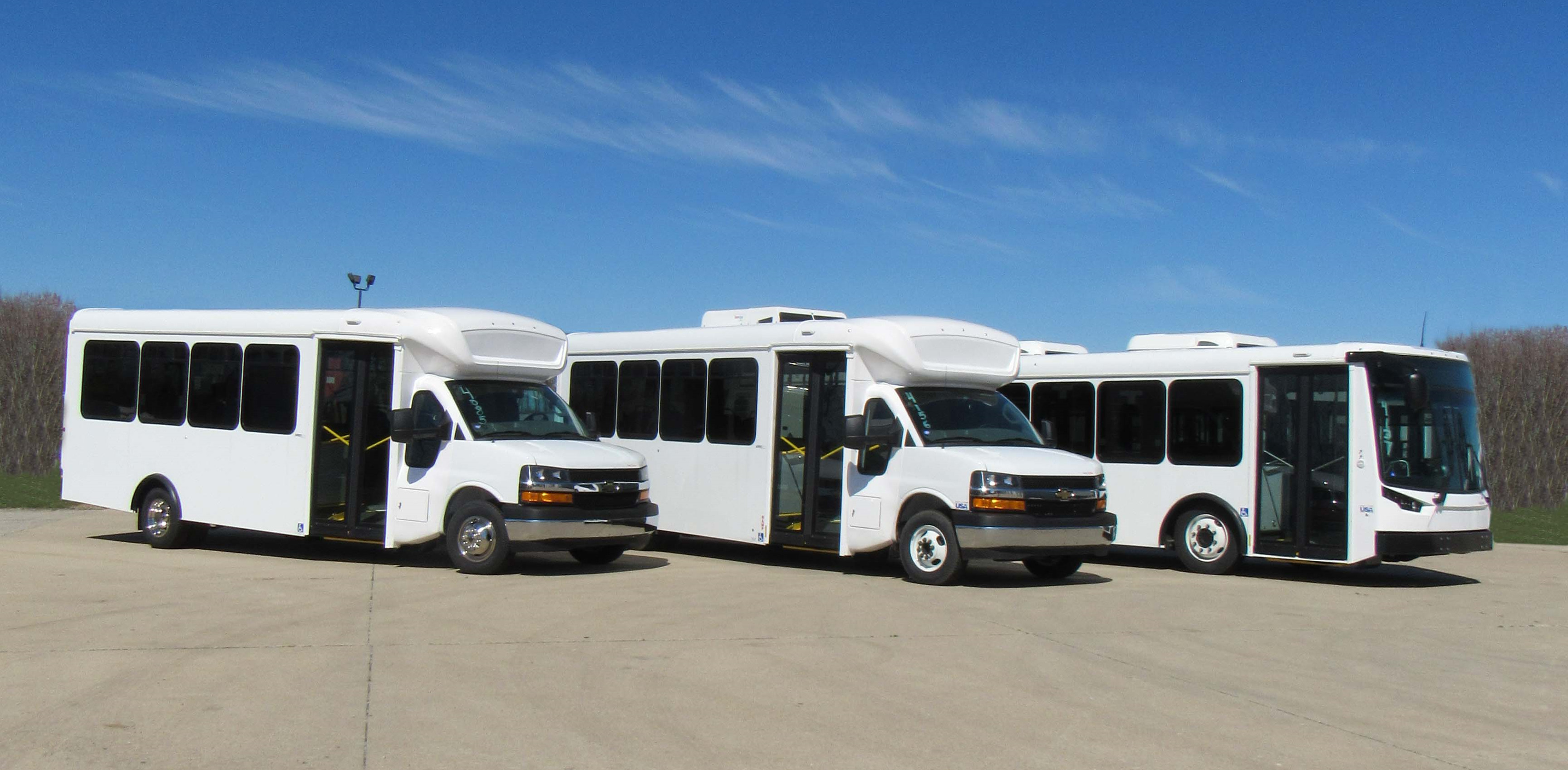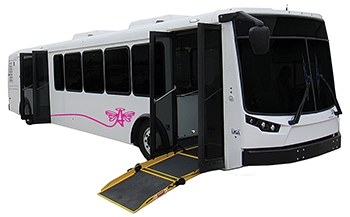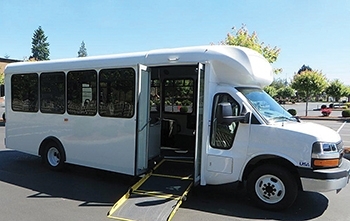
Building on a legacy of accessibility and exceptional service, ARBOC Specialty Vehicles® is poised in 2020 to refine its vehicle offerings and further improve its organizational efficiency.

Doug Minix, general manager, joined ARBOC in December and plunged headfirst into the bus industry, overseeing the company’s direction during the COVID-19 pandemic. The next year, he said, will be focused on quickly ramping up operations and meeting the steady demand for cutaway vehicles. The company restarted full production in May at its Middlebury, Indiana facility.
“As we get through this restart phase, moving out from the pandemic’s restrictions, ARBOC has been very fortunate,” Minix said. “Our cutaway business is strong and continues to grow. That means new customers, and we are obviously excited about that. We are working to improve our operational efficiencies, streamline business processes, and increase our throughput of vehicles.”
Founded in 2008, ARBOC is a North American leader in producing low-floor cutaway buses, and recently began serving medium-duty transit and shuttle bus markets. ARBOC’s motto is “Equal Access for Everyone®,” and its vehicles are purpose-built with accessibility in mind. The past few years have been transitional for the company. The company joined the NFI Group in 2017, alongside New Flyer, Motor Coach Industries, Alexander Carfair, Plaxton and NFI Parts.
December 2019 saw Minix joining the company as its new general manager, but also saw the retirement of Don Roberts. Roberts served as president of ARBOC for 11 years and was one of only two remaining co-founders working at the company.
“Assuming Don’s role in the company is obviously a big task,” Minix said. “But I was fortunate in that my arrival and his final weeks at ARBOC overlapped. I was able to spend some time with him and learned a great deal about the business, his philosophies, how he built ARBOC, his time in the industry and other insights which I think will help me as I go forward in my career with ARBOC and the bus industry.”
Minix has three decades of operational and general management experience. He served at Tenneco, a leading Tier 1 automotive supplier, for over 16 years and held the position of executive director of operations. He also has leadership experience in the medical device and recreational vehicle supply industries, which helped him transition to ARBOC – a company which excels at providing transportation solutions for people with medical infirmities and people using wheelchairs.
“I find that it’s easy to get along with teams that work well together, and we have an extraordinarily strong team at ARBOC,” he said. “My orientation and onboarding to the company has been as seamless as possible, and a positive experience. There are many similarities between ARBOC’s business and what I am familiar with in the automotive sector. Many elements of service and stewardship carry through between industries.”
ARBOC’s four main vehicle models will remain the company’s priority in 2020 and 2021:
 Spirit of Equess – Accommodating up to 33 ambulatory and six wheelchair passengers, the Spirit of Equess is purpose-built for shuttle and transit service. With no steps, the vehicle features a 1:8 ramp slope and a 39-inch entrance door. The ARBOC Specialty Vehicles chassis features a Cummins ISB 6.7L Diesel or 6.7G CNG engine, and an Allison B220 six-speed automatic transmission. It is available in lengths of 27, 30, and 34 feet. The Equess is available with a host of upgradeable safety features, including a lane-departure notification as well as a driver fatigue system. The air-suspension system with six airbags allows the bus to kneel as much as 3.5 inches, a feature which can lower the ramp to curbside level.
Spirit of Equess – Accommodating up to 33 ambulatory and six wheelchair passengers, the Spirit of Equess is purpose-built for shuttle and transit service. With no steps, the vehicle features a 1:8 ramp slope and a 39-inch entrance door. The ARBOC Specialty Vehicles chassis features a Cummins ISB 6.7L Diesel or 6.7G CNG engine, and an Allison B220 six-speed automatic transmission. It is available in lengths of 27, 30, and 34 feet. The Equess is available with a host of upgradeable safety features, including a lane-departure notification as well as a driver fatigue system. The air-suspension system with six airbags allows the bus to kneel as much as 3.5 inches, a feature which can lower the ramp to curbside level.
 Spirit of Mobility – Offered with a single 39-inch wide entry with bi-fold ramps, the Spirit of Mobility’s full air-ride suspension includes a kneeling feature allowing for a 1:6 ramp slope and an entrance of less than five inches from the curb without deploying the ramp. Other standard features that differentiate the Spirit of Mobility include an integrated steel structure body on-chassisconstruction with full 1,000-hour salt spray corrosion protection, as well as the Bolt-n-Bond assembly process, which greatly reduces interior noise.
Spirit of Mobility – Offered with a single 39-inch wide entry with bi-fold ramps, the Spirit of Mobility’s full air-ride suspension includes a kneeling feature allowing for a 1:6 ramp slope and an entrance of less than five inches from the curb without deploying the ramp. Other standard features that differentiate the Spirit of Mobility include an integrated steel structure body on-chassisconstruction with full 1,000-hour salt spray corrosion protection, as well as the Bolt-n-Bond assembly process, which greatly reduces interior noise.
 Spirit of Freedom — This fully accessible, low-floor bus provides a single 39-inch wide entry with bi-fold ramp. It utilizes the spring suspension and offers a 1:5 ramp slope, which exceeds the current ADA-regulation. The spacious interior presents ample space for wheelchairs and the theater seating provides premium viewing for all passengers. The bus is available in gasoline, CNG, and propane on the Ford chassis and gasoline on the Chevrolet chassis. With a 21-seated passenger and six wheelchair capacity, the Spirit of Freedom is optimal for demand-response and fixed-route services.
Spirit of Freedom — This fully accessible, low-floor bus provides a single 39-inch wide entry with bi-fold ramp. It utilizes the spring suspension and offers a 1:5 ramp slope, which exceeds the current ADA-regulation. The spacious interior presents ample space for wheelchairs and the theater seating provides premium viewing for all passengers. The bus is available in gasoline, CNG, and propane on the Ford chassis and gasoline on the Chevrolet chassis. With a 21-seated passenger and six wheelchair capacity, the Spirit of Freedom is optimal for demand-response and fixed-route services.
 Spirit of Independence – Built on the fuel-efficient Ford Transit T350 Cutaway chassis, the Spirit of Independence has a 96-inch-wide body, with a capacity of up to 15 ambulatory passengers or five passengers using wheelchairs. Occupants appreciate the superior headroom and comfortable ride, as well as the visibility offered by the large passenger windows. ARBOC built the low-floor vehicle on a spring suspension using the same tried and true construction methods they apply to all their products. The Spirit of Independence is powered by a 3.5L V6 gasoline engine and six-speed automatic transmission, which ARBOC says allows the bus to achieve a fuel economy of 9 to 12 miles per gallon. It also features a 12-volt electrical multiplex system from I/O Controls. The Spirit of Independence is especially appealing because of its low cost of ownership – the lowest operational cost of any ARBOC vehicle. Furthermore, its chassis can be serviced at any Ford dealership.
Spirit of Independence – Built on the fuel-efficient Ford Transit T350 Cutaway chassis, the Spirit of Independence has a 96-inch-wide body, with a capacity of up to 15 ambulatory passengers or five passengers using wheelchairs. Occupants appreciate the superior headroom and comfortable ride, as well as the visibility offered by the large passenger windows. ARBOC built the low-floor vehicle on a spring suspension using the same tried and true construction methods they apply to all their products. The Spirit of Independence is powered by a 3.5L V6 gasoline engine and six-speed automatic transmission, which ARBOC says allows the bus to achieve a fuel economy of 9 to 12 miles per gallon. It also features a 12-volt electrical multiplex system from I/O Controls. The Spirit of Independence is especially appealing because of its low cost of ownership – the lowest operational cost of any ARBOC vehicle. Furthermore, its chassis can be serviced at any Ford dealership.
Navigating the global pandemic
ARBOC, like every American manufacturing company, experienced a significant slowdown due to the COVID-19 crisis. Minix said the ARBOC team spent their downtime focusing on ways the company could improve its offerings when restrictions lifted.
For example, ARBOC launched its Spirit of Equess model in 2018 to acceptance and enthusiasm from its customer base. Still, Minix said, the company has been carefully collecting feedback from its customers, recording their recommendations.
“We have learned a lot during this time,” he said. “We focused on what we could focus on. We looked at customer feedback regarding the Equess, as well as some other changes we have wanted to make. We are excited to be making some of those changes in the second and third quarters of 2020, which we can announce soon. We will continue to ensure that ARBOC is providing the market’s best vehicles.”
Moving ahead
Minix said that further integration with NFI Group® is a goal in 2020 and moving into 2021. It has been important, he said, to both ARBOC and NFI that the parent group’s influence not fundamentally change ARBOC’s way of doing business.
“Both teams want ARBOC to continue to do what ARBOC does best, and what made it successful,” he said. “But, by that same token, NFI Group offers many great tools and resources that ARBOC is using to improve our business operations.”
Notably, Minix said, ARBOC is taking advantage of NFI Parts® – the parts point-of-purchase for the NFI Group’s expansive family of transit and coach vehicles. By leveraging the organization and throughput of NFI Parts, the ARBOC team is freed up to focus on high-quality, safe bus building.
“Using NFI Parts for parts organization has opened up space in our plant and allowed us to focus time and energy on our innovative products,” he said.
Minix continued by reiterating his aim to improve ARBOC’s operational efficiencies wherever possible.
“As with any business, ARBOC does many great things – and can always improve in certain areas,” he said. “My goal is to help this team continue to do what they do well. Then, as we identify shortcomings or areas needing improvement, my goal is to make sure we allocate resources and attention to those areas in order to drive that improvement.”

